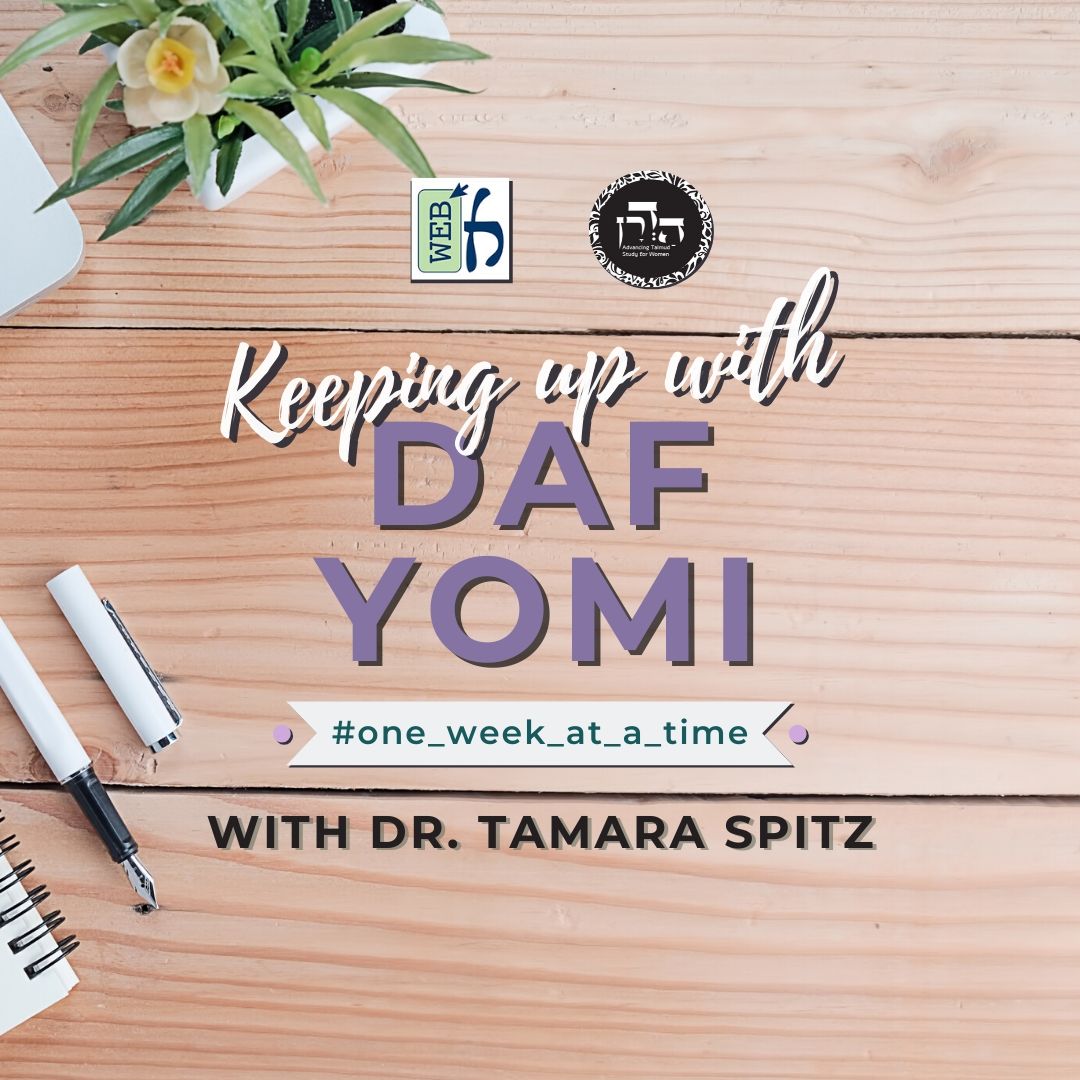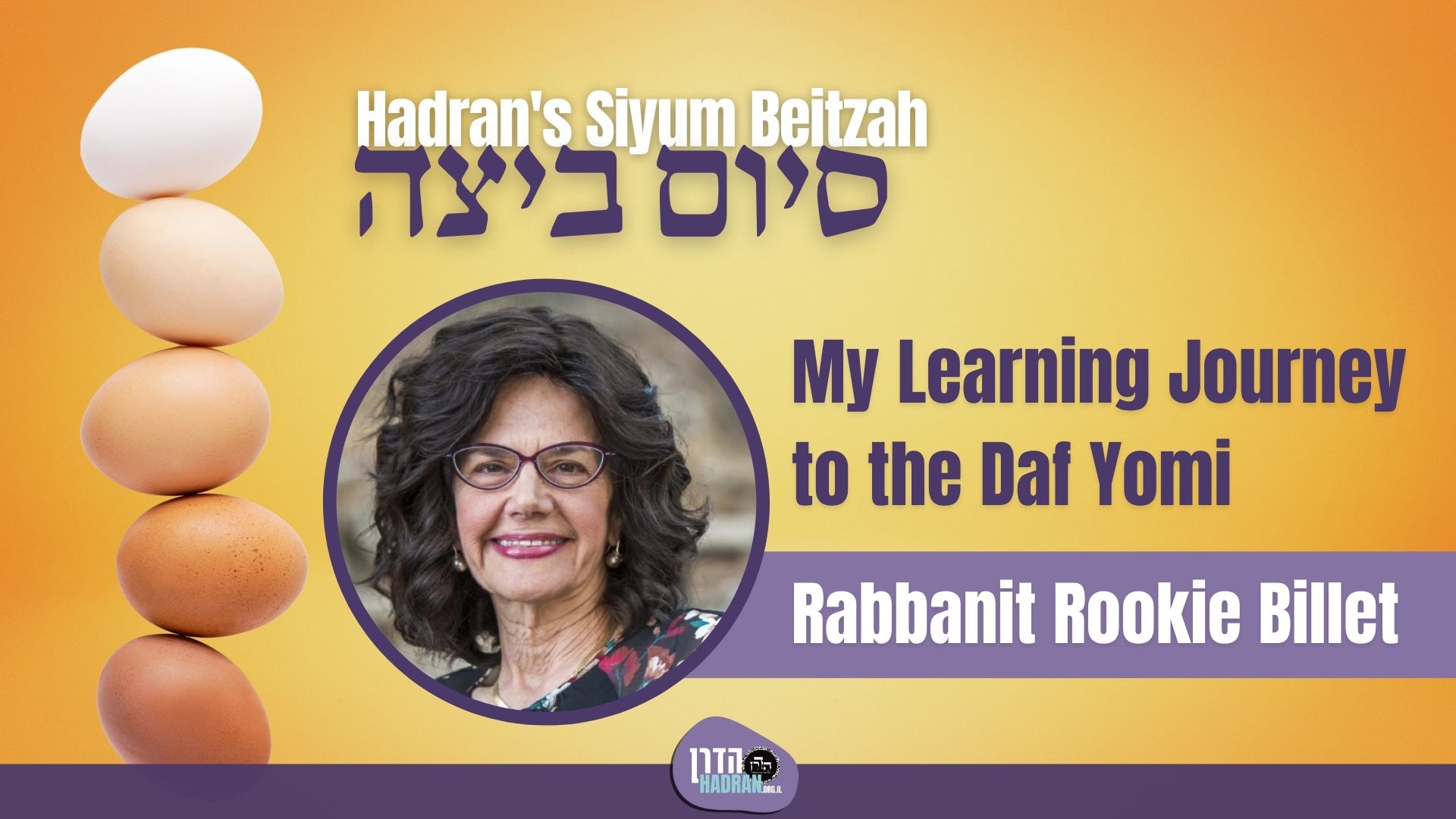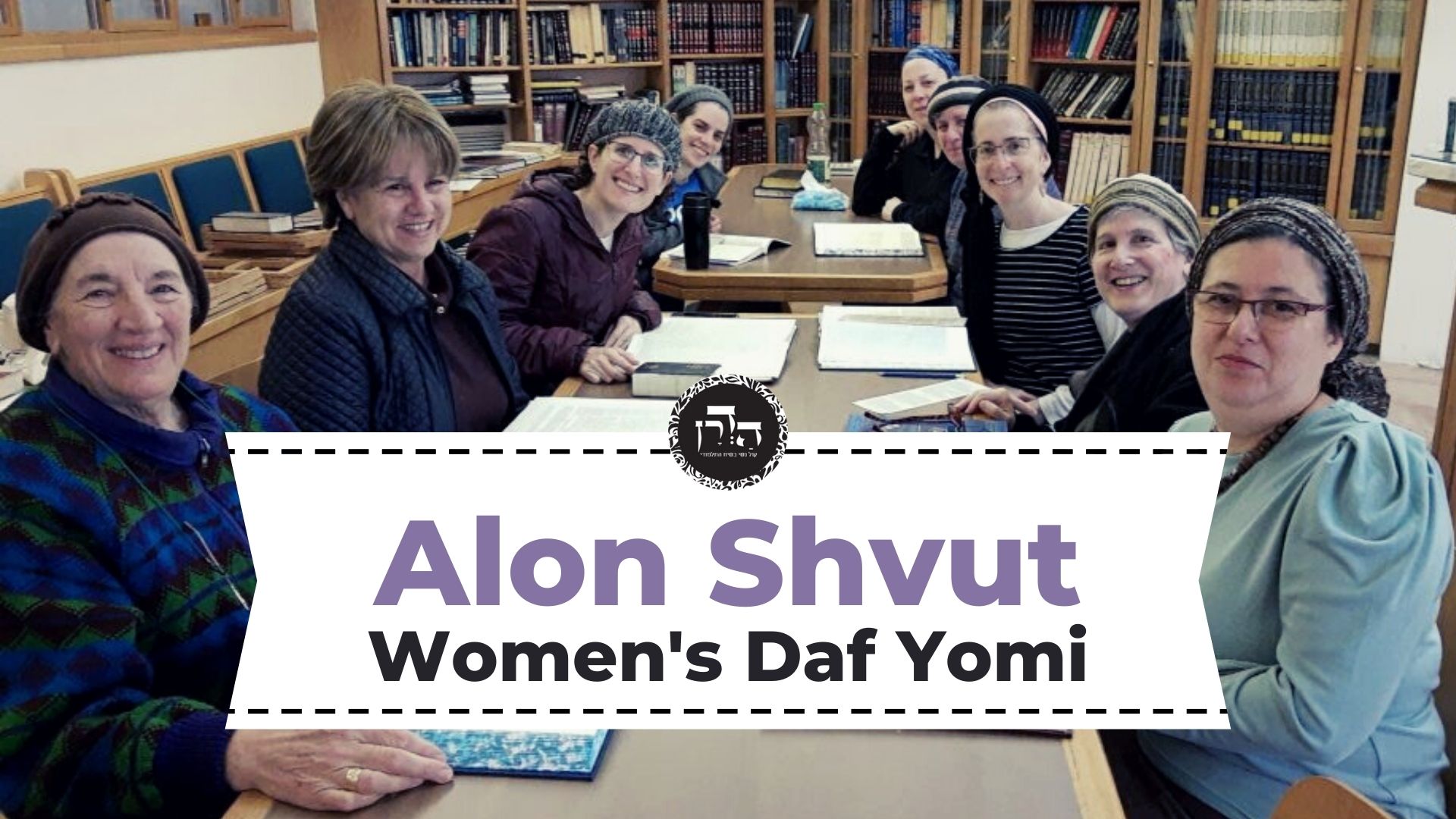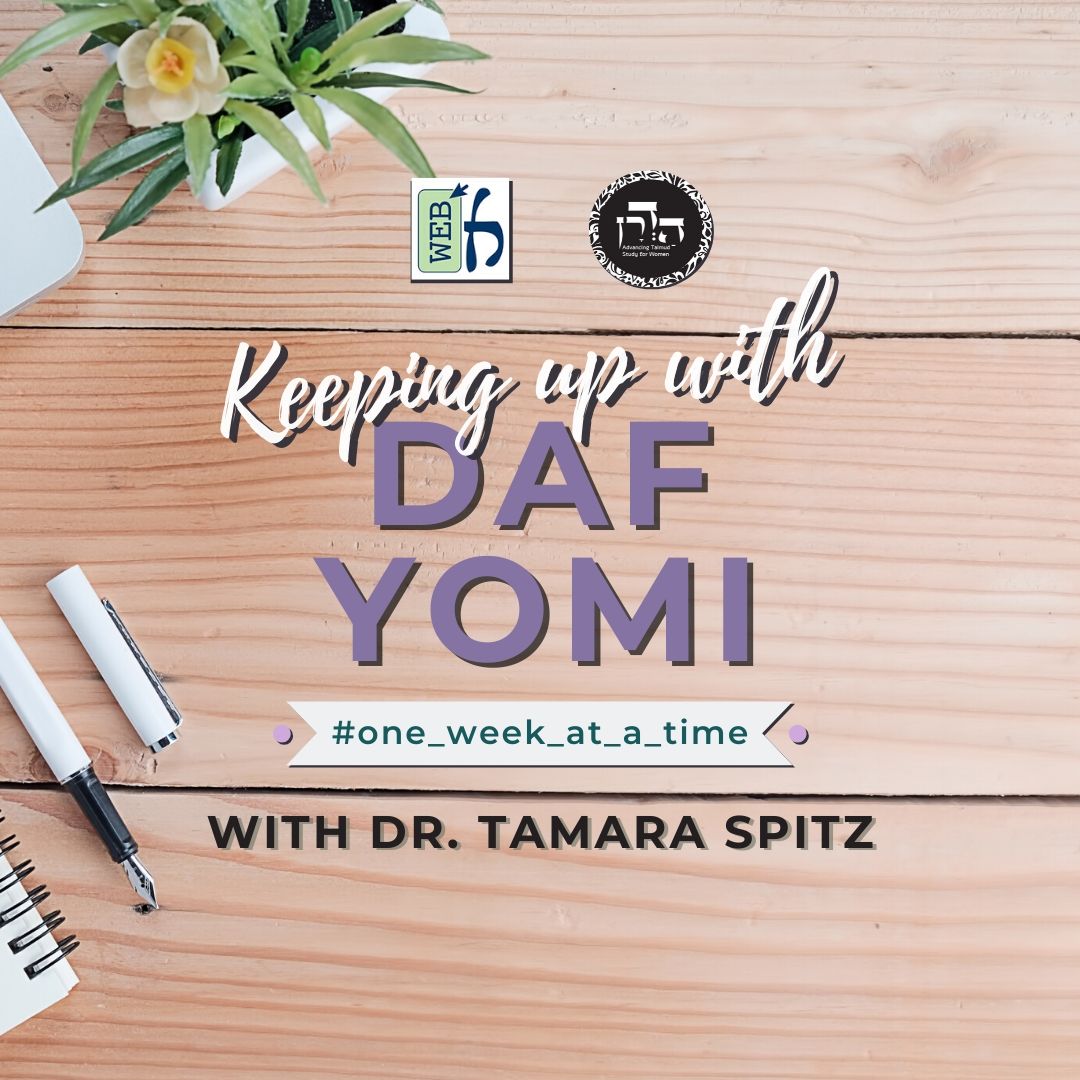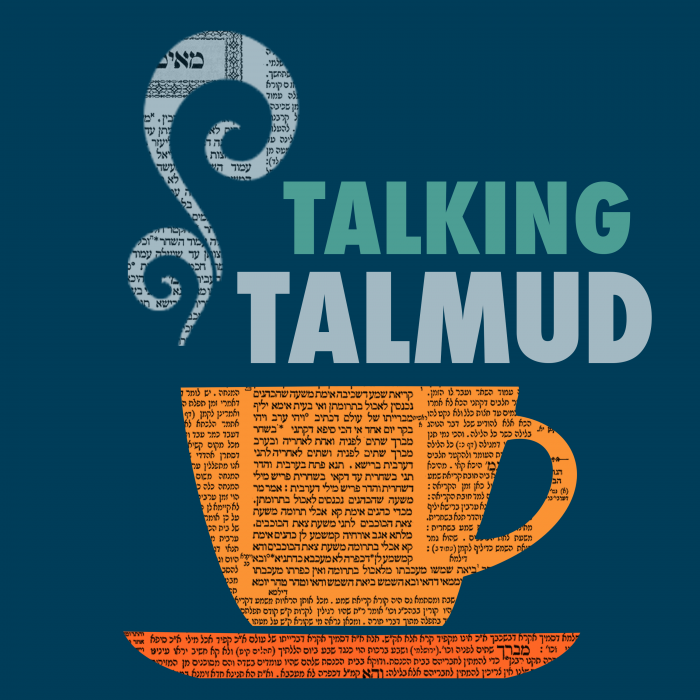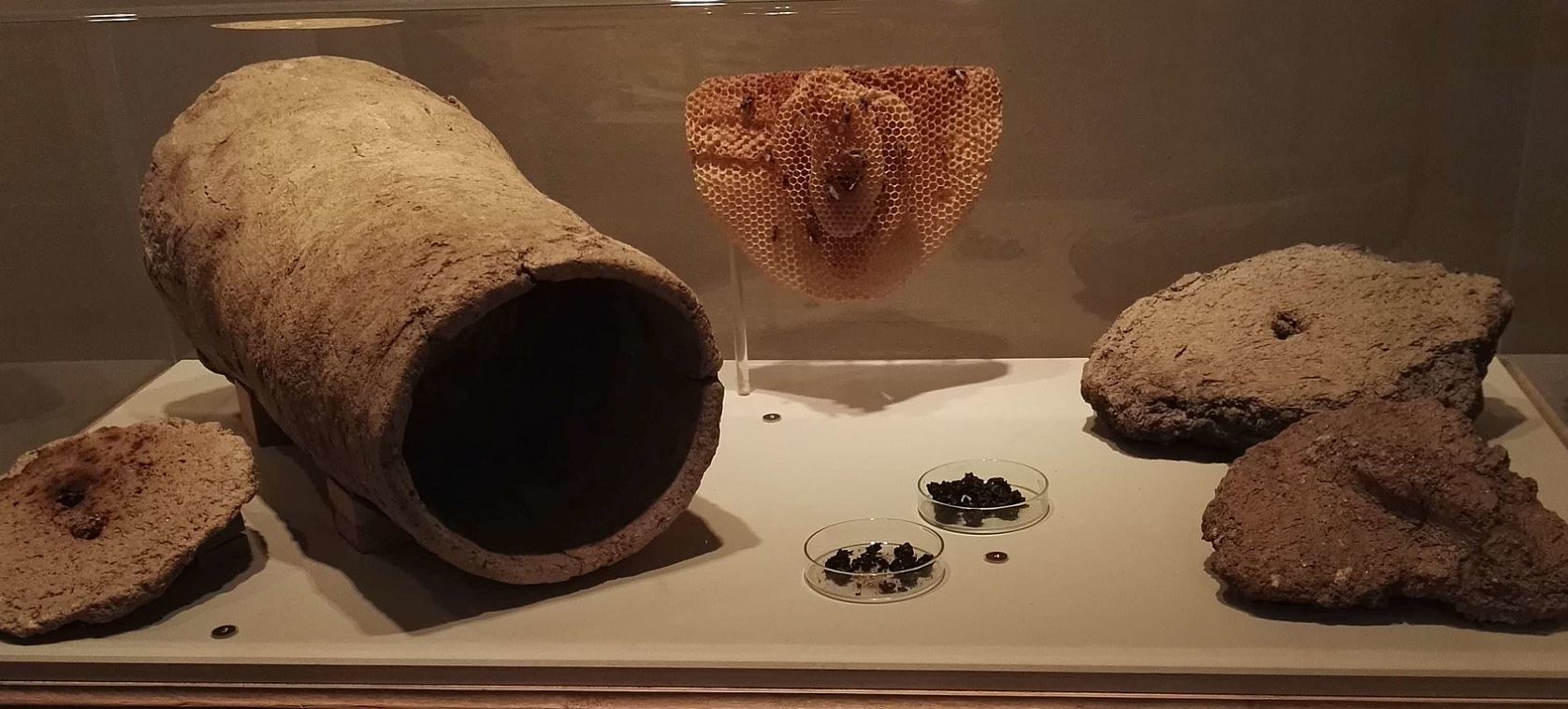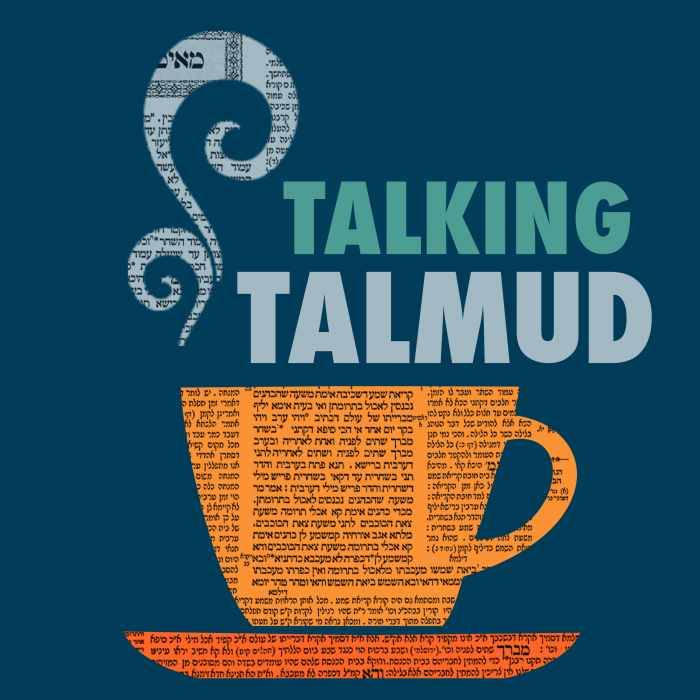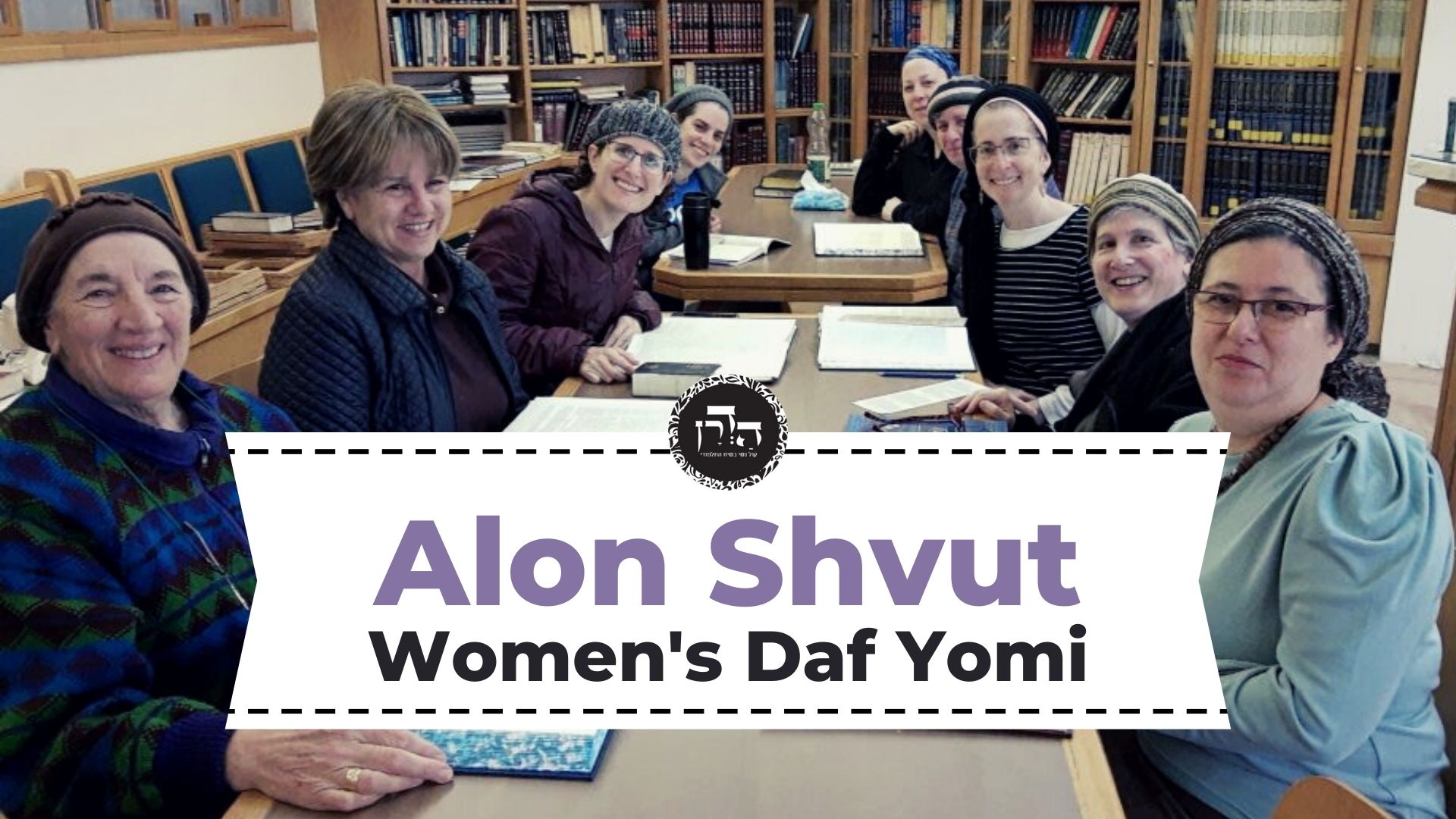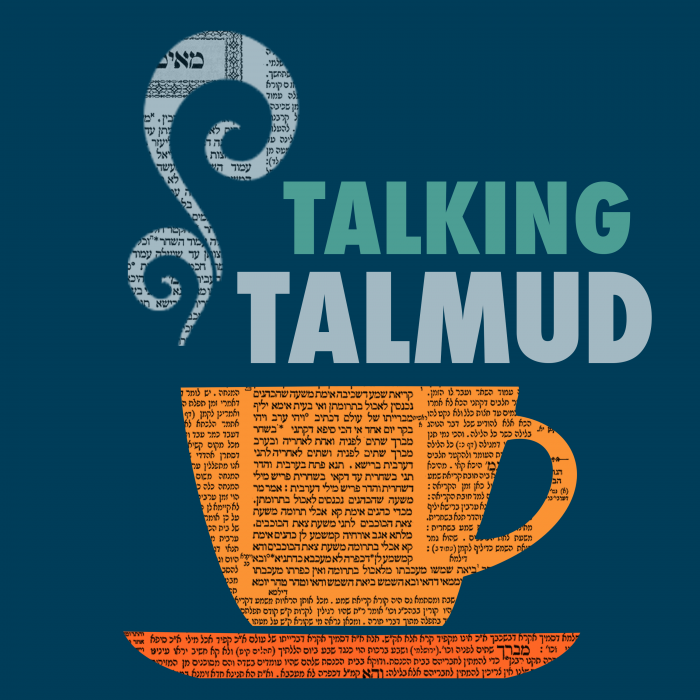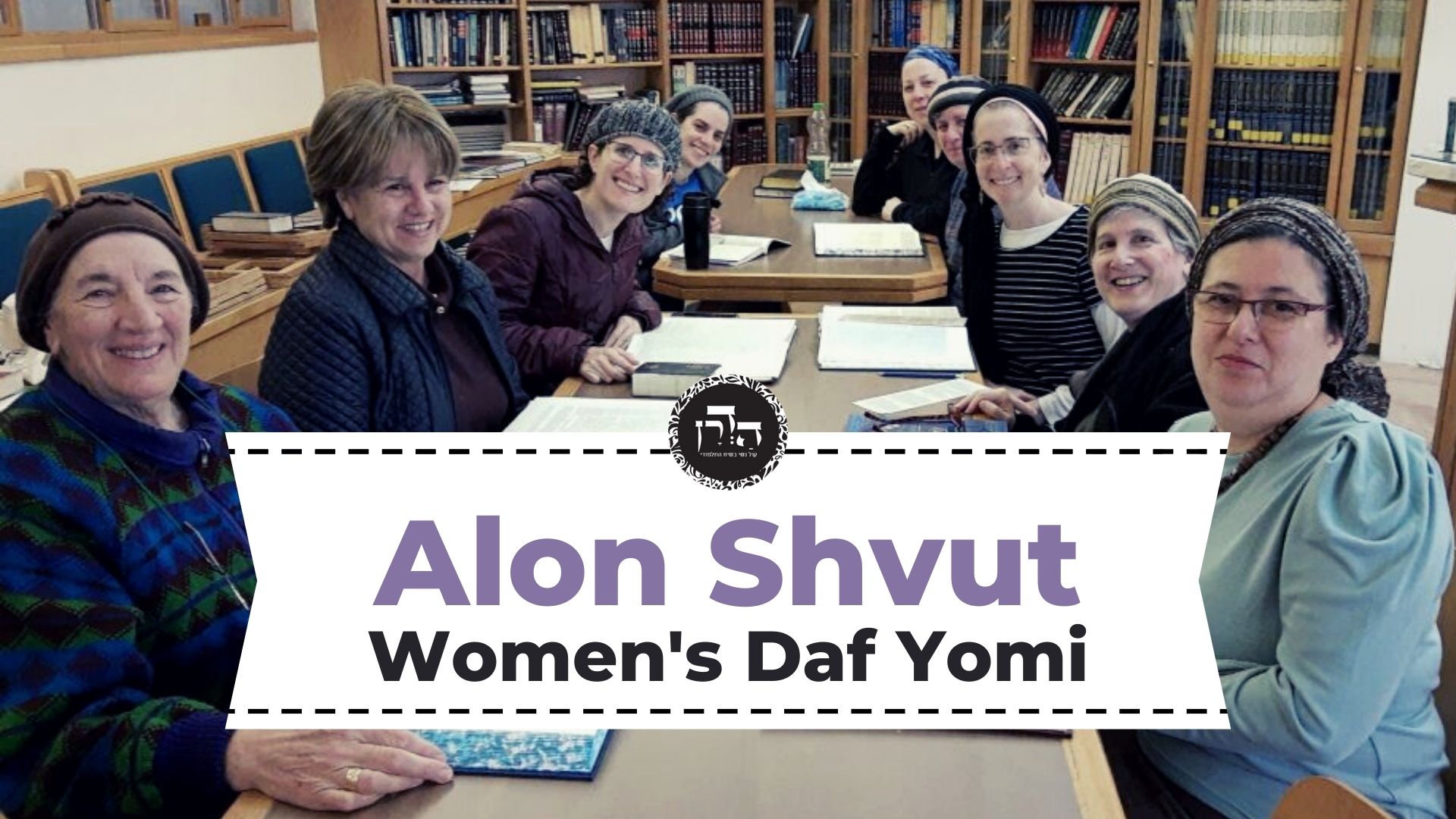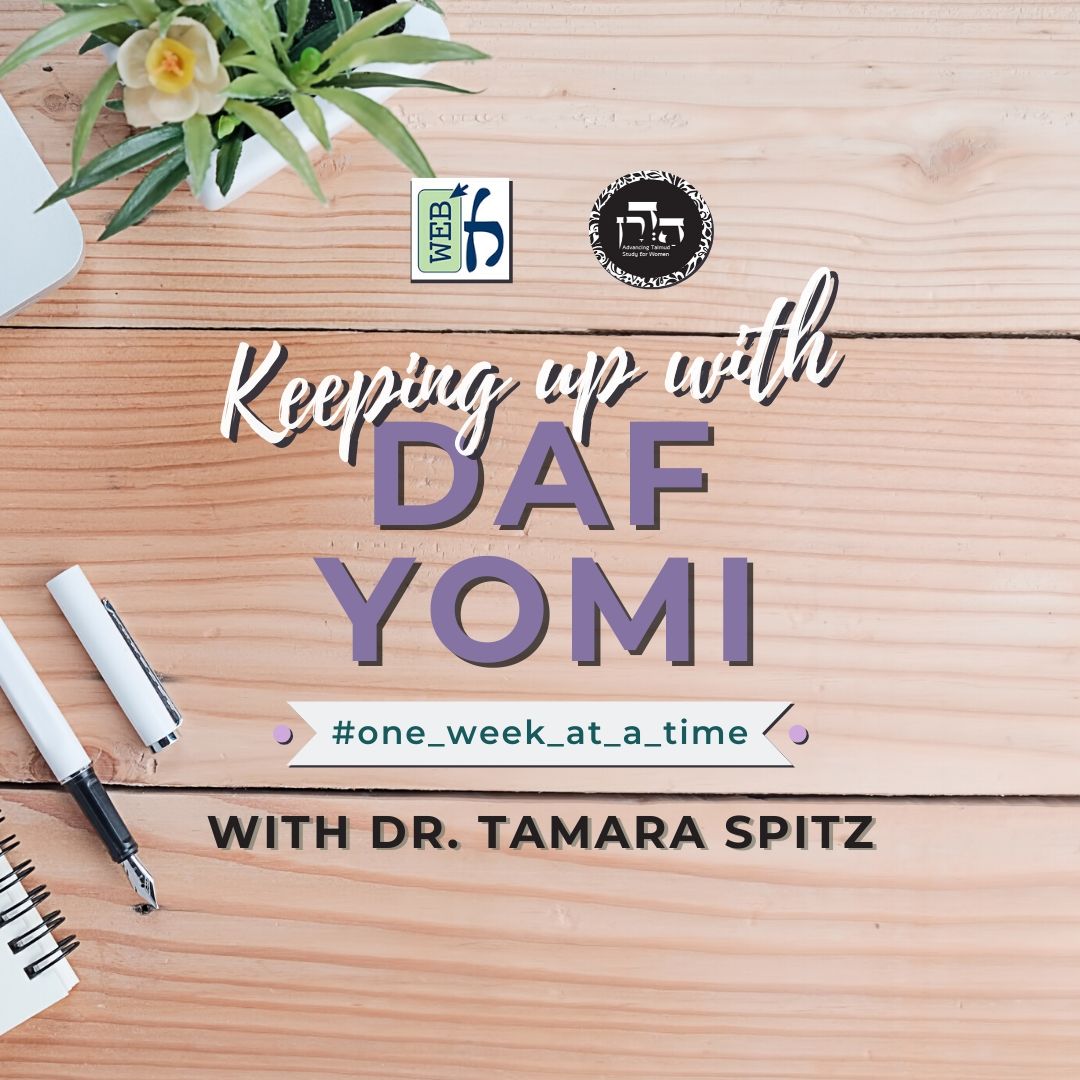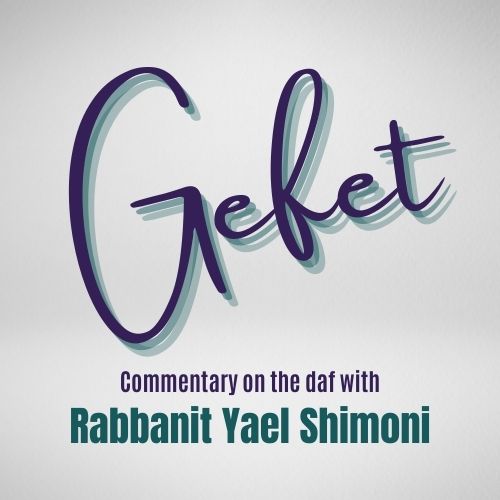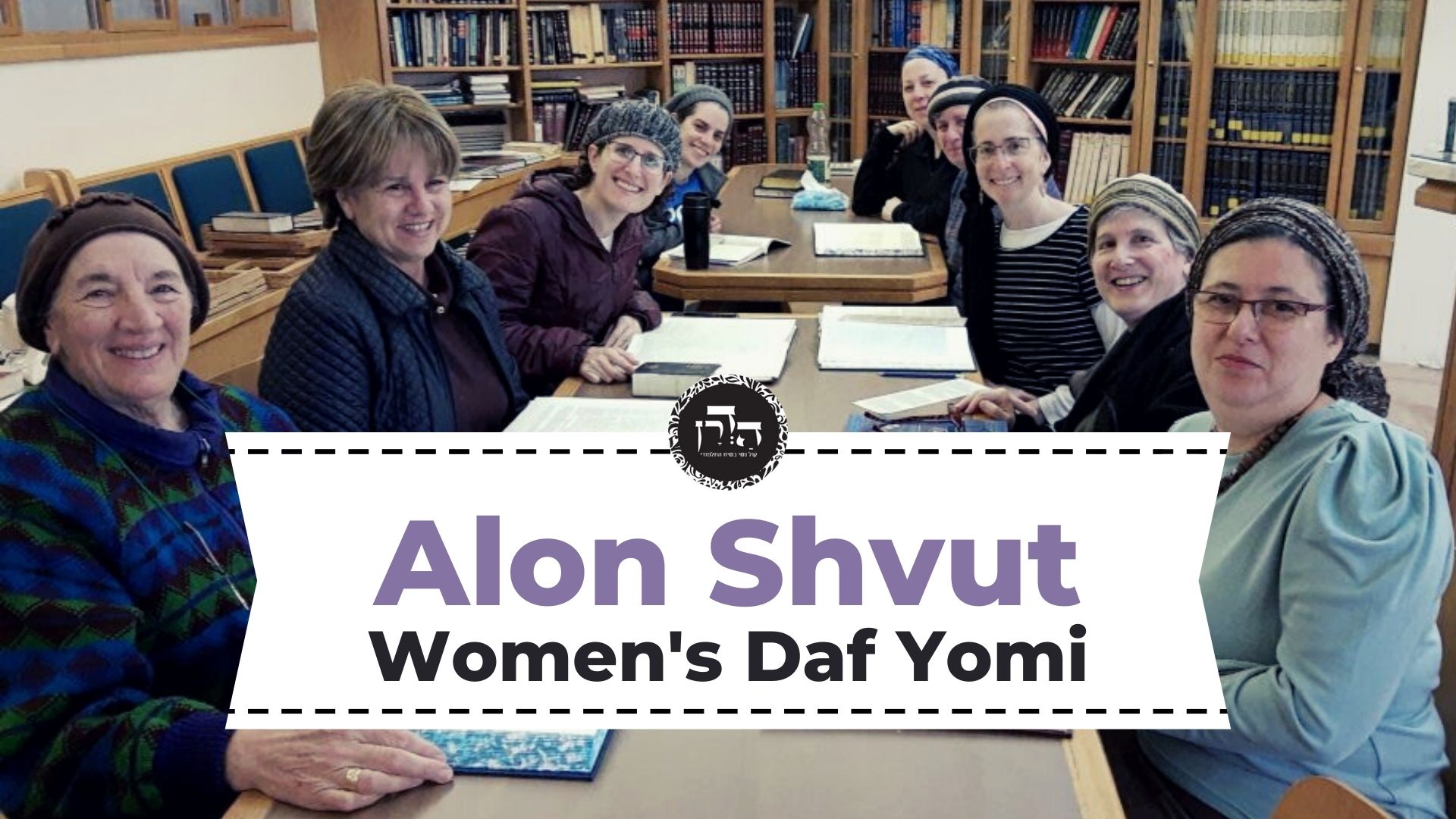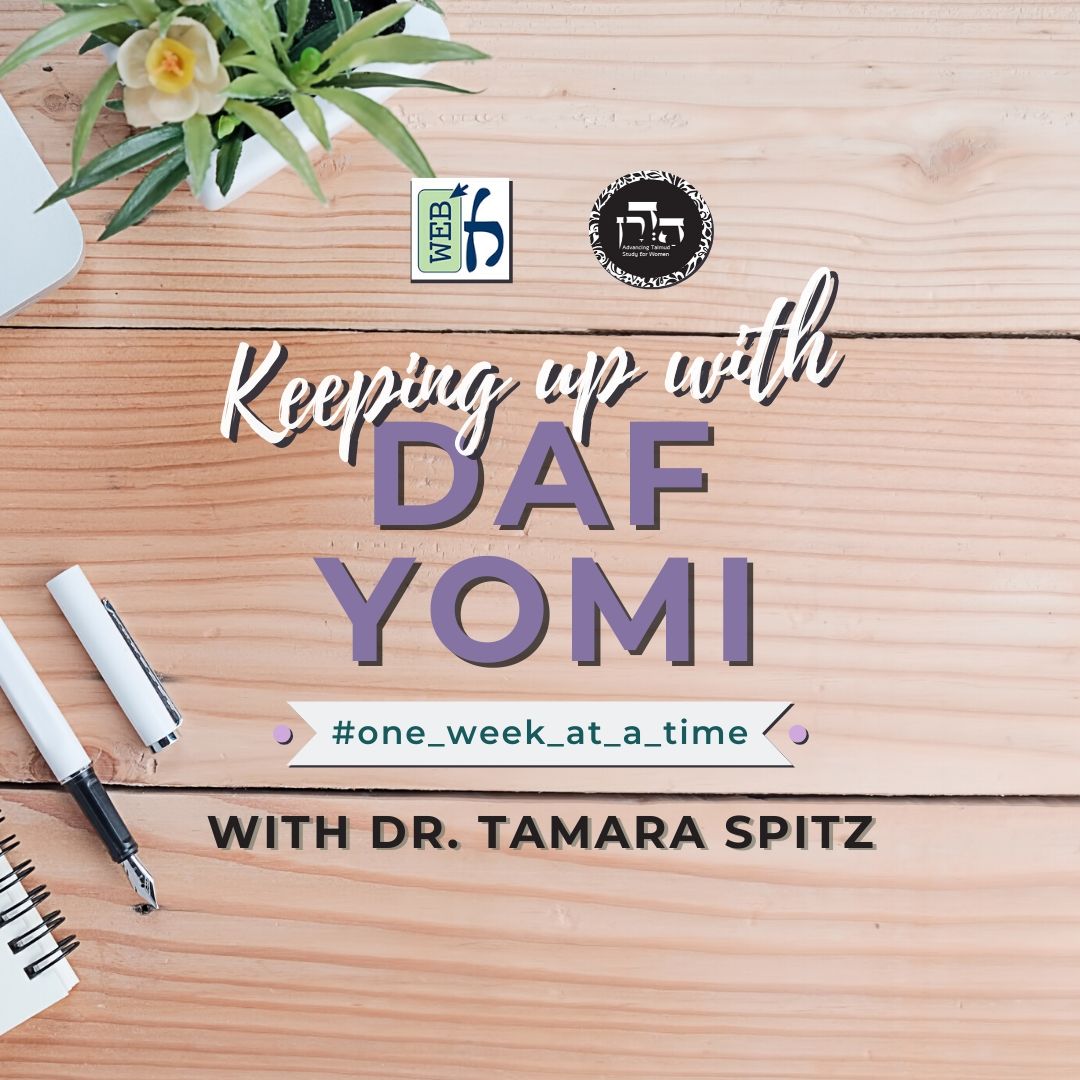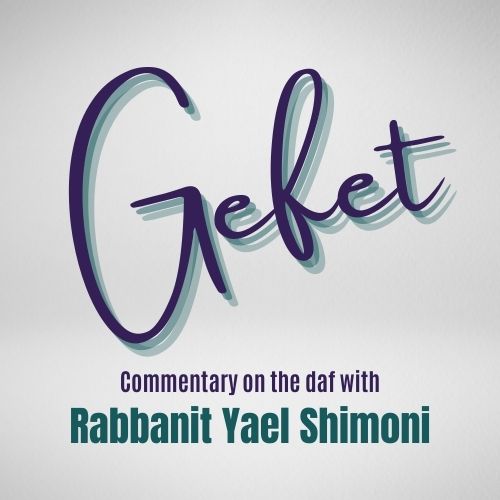Beitzah 14
מִקִּשְׁרֵי אֶצְבְּעוֹתָיו וּלְמַעְלָה.
from the joints of his fingers and above, i.e., he does not place the kernels mixed with chaff in his palm but on his fingers, which is an unusual way to hold them.
מַחֲכוּ עֲלַהּ בְּמַעְרְבָא: כֵּיוָן דִּמְשַׁנֵּי — אֲפִילּוּ בְּכוּלַּהּ יְדָא נָמֵי. אֶלָּא אָמַר רַבִּי אֶלְעָזָר: מְנַפֵּחַ בְּיָדוֹ אַחַת, וּבְכָל כֹּחוֹ.
They laughed at this explanation in the West, Eretz Yisrael, saying: Since he alters his behavior from the usual method, doing so even with his entire hand should be permitted as well. Rather, the halakha is as Rav Elazar said: One may blow while holding the grain with one hand but not two, and he may even do so with all his strength, as this is not considered similar to a prohibited labor at all.
מַתְנִי׳ בֵּית שַׁמַּאי אוֹמְרִים: תַּבְלִין נִדּוֹכִין בְּמָדוֹךְ שֶׁל עֵץ, וְהַמֶּלַח בְּפַךְ וּבְעֵץ הַפָּרוּר. וּבֵית הִלֵּל אוֹמְרִים: תַּבְלִין נִדּוֹכִין כְּדַרְכָּן בְּמָדוֹךְ שֶׁל אֶבֶן, וְהַמֶּלַח בְּמָדוֹךְ שֶׁל עֵץ.
MISHNA: Beit Shammai say: Spices may be pounded on a Festival in a slightly unusual manner, with a wooden pestle, and salt may be pounded only with an earthenware flask or with a wooden pot ladle, in a manner very different from that of a weekday. And Beit Hillel say: Spices may be pounded in their usual manner, even with a stone pestle, and as for salt, although it must be pounded in an irregular manner, a slight modification such as pounding it with a wooden pestle is enough to render the act permitted.
גְּמָ׳ דְּכוּלֵּי עָלְמָא מִיהַת מֶלַח בָּעֲיָא שִׁנּוּי. מַאי טַעְמָא? רַב הוּנָא וְרַב חִסְדָּא, חַד אָמַר: כׇּל הַקְּדֵרוֹת כּוּלָּן צְרִיכוֹת מֶלַח, וְאֵין כׇּל הַקְּדֵרוֹת צְרִיכוֹת תַּבְלִין.
GEMARA: In any event, everyone, both Beit Shammai and Beit Hillel, agrees that the pounding of salt requires a change; it may not be performed in the regular weekday manner. What is the reason for this? Rav Huna and Rav Ḥisda disputed this issue. One of them said: Everyone knows that all dishes require salt, and therefore one should prepare salt the day before the Festival. Since he failed to do so, this task may be performed on the Festival only in an unusual manner. But not all dishes require spices, and therefore it is possible that on the day prior to the Festival, one was not aware that he would require spices on the Festival.
וְחַד אָמַר: כׇּל הַתַּבְלִין מְפִיגִין טַעְמָן, וּמֶלַח אֵינָהּ מְפִיגָה טַעְמָהּ.
And the other one said a different reason: All spices lose their flavor and cannot be prepared ahead of time, and salt does not lose its flavor, which means one could have prepared it the day before. Since he neglected to do so, he may prepare salt on the Festival only in an unusual manner.
מַאי בֵּינַיְיהוּ? אִיכָּא בֵּינַיְיהוּ דְּיָדַע מַאי קְדֵרָה בָּעֵי לְבַשּׁוֹלֵי, אִי נָמֵי בְּמוֹרִיקָא.
The Gemara asks: What is the practical difference between these two reasons? The Gemara answers: The practical difference between them is in a case where one knew beforehand which type of dish he wants to cook on the Festival. Since he knew which spices he would require, he could have prepared them the day before, in which case spices are no different from salt, and one should be required to prepare them in an unusual manner. However, if the reason is that spices lose their flavor, the fact that he knew which dishes he planned to prepare is of no relevance. Alternatively, there is a practical difference in the case of saffron, whose flavor does not dissipate over the course of a single day. Consequently, one who knows what dish he will prepare on the Festival could have prepared the saffron the day before.
אָמַר רַב יְהוּדָה אָמַר שְׁמוּאֵל: כׇּל הַנִּדּוֹכִין נִדּוֹכִין כְּדַרְכָּן, וַאֲפִילּוּ מֶלַח. וְהָא אָמְרַתְּ מֶלַח בָּעֲיָא שִׁנּוּי! הוּא דְּאָמַר כִּי הַאי תַּנָּא, דְּתַנְיָא, אָמַר רַבִּי מֵאִיר: לֹא נֶחְלְקוּ בֵּית שַׁמַּאי וּבֵית הִלֵּל עַל הַנִּדּוֹכִין שֶׁנִּדּוֹכִין כְּדַרְכָּן וּמֶלַח עִמָּהֶן,
Rav Yehuda said that Shmuel said: All foods that must be pounded before being eaten may be pounded in their usual manner, and this applies even to salt. The Gemara challenges this: But didn’t you say that everyone agrees that salt requires a change in its manner of preparation? The Gemara answers: He said this halakha in accordance with the opinion of that tanna, as it is taught in a baraita that Rabbi Meir said: Beit Shammai and Beit Hillel did not disagree in the case of foods that are regularly pounded. They both maintain that they may be pounded in their usual manner, and salt can be pounded together with them.
לֹא נֶחְלְקוּ אֶלָּא לְדוּכָהּ בִּפְנֵי עַצְמָהּ, שֶׁבֵּית שַׁמַּאי אוֹמְרִים: מֶלַח בְּפַךְ וּבְעֵץ הַפָּרוּר לְצָלִי, אֲבָל לֹא לִקְדֵרָה. וּבֵית הִלֵּל אוֹמְרִים: בְּכׇל דָּבָר. בְּכׇל דָּבָר סָלְקָא דַּעְתָּךְ? אֶלָּא אֵימָא: לְכׇל דָּבָר.
They disagreed only about whether it is permitted to pound salt by itself, as Beit Shammai say: Salt may be pounded with a flask and with a wooden pot ladle for roasting, i.e., in small quantities, as one does not require much salt for roasting meat, but it may not be pounded in the large quantities required to salt meat for a cooked pot. And Beit Hillel say: It may be pounded by anything. The Gemara expresses surprise at this last statement: By anything? Can this enter your mind? How can Beit Hillel say that one may pound salt in any manner, when it has been established that everyone agrees that this may be performed only in an unusual manner? Rather, say: Salt may be pounded for anything, whether it is a small quantity for roasting or a large quantity for salting meat.
אָמַר לֵיהּ רַב אַחָא בַּרְדְּלָא לִבְרֵיהּ: כִּי דָיְיכַת אַצְלִי אַצְלוֹיֵי וְדוּךְ. רַב שֵׁשֶׁת שְׁמַע קָל בּוּכְנָא, אֲמַר: הַאי לָאו מִגַּוֵּויהּ דְּבֵיתַאי הוּא.
Rav Aḥa Bardela said to his son: When you pound salt, tilt it a little to the side and then pound, so that it will at least be performed in a slightly different manner on a Festival. The Gemara similarly relates: Rav Sheshet heard the sound of a pestle pounding salt on a Festival. He said to himself: This sound is not coming from inside my house, as I have instructed the members of my household not to do so.
וְדִלְמָא אַצְלוֹיֵי אַצְלִי? דְּשַׁמְעֵיהּ דַּהֲוָה צְלִיל קָלֵיהּ. וְדִלְמָא תַּבְלִין הֲווֹ? תַּבְלִין נַבּוֹחֵי מְנַבַּח קָלַיְיהוּ.
The Gemara asks: But perhaps they tilted it and pounded in a permitted manner? The Gemara answers: This could not have been the case, as Rav Sheshet heard that it was a clear sound, unlike the one produced when a pestle is tilted. The Gemara asks: But perhaps they were pounding spices, which may be pounded in the regular fashion on a Festival? The Gemara answers: The sound produced by pounding spices is distinctive, like a bark, which he would have recognized.
תָּנוּ רַבָּנַן: אֵין עוֹשִׂין טִיסְנִי, וְאֵין כּוֹתְשִׁין בְּמַכְתֶּשֶׁת. תַּרְתֵּי?! הָכִי קָאָמַר: מַה טַּעַם אֵין עוֹשִׂין טִיסְנִי — לְפִי שֶׁאֵין כּוֹתְשִׁין בְּמַכְתֶּשֶׁת.
§ The Sages taught in a baraita: On a Festival one may not prepare groats [tisanei], a dish comprised of grains of wheat crushed into quarters, which involves great effort, nor may one grind grain with a mortar and pestle. The Gemara expresses puzzlement: These are two contradictory rulings. The tanna first stated that groats alone may not be prepared, as this involves hard work, implying that other items may be ground. He subsequently states that one may not grind with a mortar and pestle at all. The Gemara answers: This is what he said: The baraita should be amended to read as follows: What is the reason that one may not prepare groats? Because one may not grind with a mortar and pestle.
וְלֵימָא: אֵין כּוֹתְשִׁין בְּמַכְתֶּשֶׁת! אִי תָּנֵי אֵין כּוֹתְשִׁין בְּמַכְתֶּשֶׁת, הֲוָה אָמֵינָא: הָנֵי מִילֵּי בְּמַכְתֶּשֶׁת גְּדוֹלָה, אֲבָל בְּמַכְתֶּשֶׁת קְטַנָּה — אֵימָא שַׁפִּיר דָּמֵי, קָא מַשְׁמַע לַן.
And let the tanna simply say: One may not grind with a mortar and pestle, from which it can be inferred that groats may not be prepared. The Gemara explains that if he teaches only: One may not grind with a mortar and pestle, I would have said that this applies only to a large mortar and pestle, whose use has the appearance of a weekday activity; but with a small mortar and pestle, one might say it seems well, and one may prepare even groats with this mortar and pestle. The tanna therefore teaches us that groats may not be prepared in any manner.
וְהָתַנְיָא: אֵין כּוֹתְשִׁין בְּמַכְתֶּשֶׁת גְּדוֹלָה, אֲבָל כּוֹתְשִׁין בְּמַכְתֶּשֶׁת קְטַנָּה! אָמַר אַבָּיֵי: כִּי תַּנְיָא נָמֵי מַתְנִיתָא — מַכְתֶּשֶׁת גְּדוֹלָה תַּנְיָא.
The Gemara challenges this: But isn’t it taught explicitly in a baraita that one may not grind with a large mortar and pestle, but one may grind with a small mortar and pestle? Abaye said: Also, when the first baraita was taught, it was taught with regard to a large mortar and pestle, not a small one. In other words, the baraita is stating two halakhot, not one, as claimed previously. The tanna first rules that one may not prepare groats even with a small mortar and pestle, and he subsequently states that one may not use a large mortar and pestle for any purpose.
רָבָא אָמַר, לָא קַשְׁיָא: הָא לַן, וְהָא לְהוּ.
Rava said: This is not difficult; the baraitot do not contradict one another. This ruling, which permits a small mortar and pestle, is for us, the residents of Babylonia, who do not have servants, and that statement is for them, the inhabitants of Eretz Yisrael, who have many servants. Since servants might treat the prohibition lightly, by using a large mortar and pestle and claiming they had used only a small one, they are prohibited from pounding in all cases.
רַב פַּפֵּי אִקְּלַע לְבֵי מָר שְׁמוּאֵל. אַיְיתִי לֵיהּ דַּיְיסָא וְלָא אֲכַל. וְדִלְמָא בְּמַכְתֶּשֶׁת קְטַנָּה עַבְדוּהּ? דְּחַזְיֵיהּ דַּהֲוָה דְּיִיק טְפֵי.
The Gemara relates: Rav Pappi happened to come on a Festival to the house of Mar Shmuel. He brought to him porridge, made from wheat groats, but he did not eat it, out of concern that the wheat might have been pounded on the same day. The Gemara asks: And perhaps they performed the pounding with a small mortar and pestle, in a permitted manner? The Gemara answers: This cannot be the case, as he observed that it was well ground, which cannot be achieved by means of a small mortar and pestle.
וְדִלְמָא מֵאֶתְמוֹל עַבְדוּהּ? דְּחַזְיֵיהּ דַּהֲוָה קְלִיף צַהֲרֵיהּ. וְאִי בָּעֵית אֵימָא: שָׁאנֵי בֵּי מָר שְׁמוּאֵל, דְּאִיכָּא פְּרִיצוּתָא דְעַבְדֵי.
The Gemara asks: And perhaps they prepared it the day before, on the Festival eve? The Gemara answers: This cannot be the case, as he observed that the husks of the groats were bright, an indication that they had been prepared recently. And if you wish, say instead that he refrained from eating for another reason, because the house of Mar Shmuel is different, as he had slaves, and slaves are lax with regard to prohibitions. Therefore, Mar Shmuel ought to have prohibited all forms of grinding in his house, to ensure that no one grind anything in an inappropriate manner.
מַתְנִי׳ הַבּוֹרֵר קִטְנִיּוֹת בְּיוֹם טוֹב, בֵּית שַׁמַּאי אוֹמְרִים: בּוֹרֵר אוֹכֶל וְאוֹכֵל. וּבֵית הִלֵּל אוֹמְרִים: בּוֹרֵר כְּדַרְכּוֹ בְּחֵיקוֹ בַּקָּנוֹן וּבַתַּמְחוּי, אֲבָל לֹא בַּטַּבְלָא וְלֹא בַּנָּפָה וְלֹא בַּכְּבָרָה. רַבָּן גַּמְלִיאֵל אוֹמֵר: אַף מֵדִיחַ וְשׁוֹלֶה.
MISHNA: With regard to one who selects legumes on a Festival by separating the edible and inedible portions, Beit Shammai say: He may select food and eat it immediately, while leaving the refuse. And Beit Hillel say: He may select in his usual manner, in his lap, with a tray, or with a large vessel, but he may not do so with a tablet, nor with a winnow, nor with a sieve, as these vessels are specially designed for selecting, which gives his action the appearance of a weekday activity. Rabban Gamliel says: One may even wash the legumes in water and skim off the refuse floating on top.
גְּמָ׳ תַּנְיָא, אָמַר רַבָּן גַּמְלִיאֵל: בַּמֶּה דְּבָרִים אֲמוּרִים — כְּשֶׁהָאוֹכֶל מְרוּבֶּה עַל הַפְּסוֹלֶת, אֲבָל פְּסוֹלֶת מְרוּבָּה עַל הָאוֹכֶל — דִּבְרֵי הַכֹּל נוֹטֵל אֶת הָאוֹכֵל וּמַנִּיחַ אֶת הַפְּסוֹלֶת.
GEMARA: It is taught in a baraita: Rabban Gamliel said: In what case is this statement said? Under what circumstances did Beit Hillel permit the removal of the refuse in the weekday manner of selecting? In a case where the quantity of the food is greater than the quantity of the refuse. However, if the quantity of refuse is greater than the quantity of food, everyone agrees that one must remove the food and leave the refuse.
פְּסוֹלֶת מְרוּבָּה עַל הָאוֹכֶל מִי אִיכָּא מַאן דְּשָׁרֵי? לָא צְרִיכָא, דִּנְפִישׁ בְּטִרְחָא וְזוּטַר בְּשִׁיעוּרָא.
The Gemara asks: If the quantity of refuse is greater than the quantity of food, is there an opinion that permits it? Since the smaller amount of food is nullified by the refuse, the entire mixture is considered muktze and may not be moved. The Gemara answers: No, it is necessary to state this halakha in a case where the removal of the refuse is greater in terms of effort, and yet it is smaller in size. In other words, there is actually more food than refuse, but since greater effort is required to remove the refuse, it is preferable to remove the food.
רַבָּן גַּמְלִיאֵל אוֹמֵר: אַף מֵדִיחַ וְשׁוֹלֶה. תַּנְיָא, אָמַר רַבִּי אֶלְעָזָר בְּרַבִּי צָדוֹק: כָּךְ הָיָה מִנְהָגָן שֶׁל בֵּית רַבָּן גַּמְלִיאֵל, שֶׁהָיוּ מְבִיאִין דְּלִי מָלֵא עֲדָשִׁים וּמְצִיפִין עָלָיו מַיִם, וְנִמְצָא אוֹכֶל לְמַטָּה וּפְסוֹלֶת לְמַעְלָה.
The mishna taught that Rabban Gamliel says: One may even wash the legumes in water and skim off the refuse floating on top. It is taught (Tosefta, Beitza 1): Rabbi Elazar, son of Rabbi Tzadok, said: This was the custom of the house of Rabban Gamliel, that they would bring a bucket full with lentils and pour water in it, and then the food would sink down and the refuse would float up, which spared them from having to separate the lentils from the refuse manually.
וְהָתַנְיָא אִיפְּכָא? לָא קַשְׁיָא: הָא בְּעַפְרָא, הָא בְּגִילֵי.
The Gemara asks: But isn’t the opposite taught in another baraita, that the food rose to the top while the refuse sunk below? The Gemara answers: It is not difficult. This baraita, which says the refuse sinks down, is referring to refuse in the form of earth, which sinks below the lentils; that baraita, where it is stated that the refuse rises, speaks of straw, which floats on water.
מַתְנִי׳ בֵּית שַׁמַּאי אוֹמְרִים: אֵין מְשַׁלְּחִין בְּיוֹם טוֹב אֶלָּא מָנוֹת, וּבֵית הִלֵּל אוֹמְרִים: מְשַׁלְּחִין בְּהֵמָה חַיָּה וָעוֹף, בֵּין חַיִּין בֵּין שְׁחוּטִין. מְשַׁלְּחִין יֵינוֹת שְׁמָנִים וּסְלָתוֹת וְקִטְנִיּוֹת, אֲבָל לֹא תְּבוּאָה. וְרַבִּי שִׁמְעוֹן מַתִּיר בִּתְבוּאָה.
MISHNA: Beit Shammai say: One may send only portions of prepared food on a Festival, but not any other gifts. And Beit Hillel say: One may even send gifts of domesticated animals, undomesticated animals, and fowl, whether alive or slaughtered. Similarly, one may send wines, oils, and vessels of flour, and even legumes, but not grain, which is unfit for use, as one may not grind it on the Festival. And Rabbi Shimon permits sending gifts even in the case of grain, as it can be made into porridge without being ground.
גְּמָ׳ תָּנֵי רַב יְחִיאֵל: וּבִלְבַד שֶׁלֹּא יַעֲשֶׂנּוּ בְּשׁוּרָה. תָּנָא: אֵין שׁוּרָה פְּחוּתָה מִשְּׁלֹשָׁה בְּנֵי אָדָם. בָּעֵי רַב אָשֵׁי: תְּלָתָא גַּבְרֵי וּתְלָתָא מִינֵי מַאי? תֵּיקוּ.
GEMARA: Rav Yeḥiel teaches: And one may send these items provided that he does not do it by means of a convoy of people, as they would look as though they were transporting merchandise to the marketplace. It is taught in a baraita: A convoy consists of no less than three people; if there are fewer than three, it is not called a convoy and is permitted. Rav Ashi raised a dilemma: In a case of three people and three different types of food, what is the halakha? Is this considered a convoy, or does the fact that there are three different types of food mean that each of them is considered a separate item? The Gemara answers: The dilemma shall stand unresolved, as no answer was found.
רַבִּי שִׁמְעוֹן מַתִּיר בִּתְבוּאָה. תַּנְיָא: רַבִּי שִׁמְעוֹן מַתִּיר בִּתְבוּאָה, כְּגוֹן: חִטִּין לַעֲשׂוֹת מֵהֶן לוּדִיּוֹת, שְׂעוֹרִים לִיתֵּן לִפְנֵי בְּהֶמְתּוֹ, עֲדָשִׁים לַעֲשׂוֹת מֵהֶן רְסִיסִין.
The mishna taught that Rabbi Shimon permits the sending of grain. It is taught in a baraita: Rabbi Shimon permits the sending of grain, for example: Wheat to prepare from it ludiyot, a type of cookie; barley to place before his animal; or lentils to prepare from them resisin, a dish made from crushed lentils.
מַתְנִי׳ מְשַׁלְּחִין כֵּלִים בֵּין תְּפוּרִין בֵּין שֶׁאֵינָן תְּפוּרִין, וְאַף עַל פִּי שֶׁיֵּשׁ בָּהֶן כִּלְאַיִם וְהֵן לְצוֹרֶךְ הַמּוֹעֵד. אֲבָל לֹא סַנְדָּל הַמְסוּמָּר וְלֹא מִנְעָל שֶׁאֵינוֹ תָּפוּר. רַבִּי יְהוּדָה אוֹמֵר: אַף לֹא מִנְעָל לָבָן, מִפְּנֵי שֶׁצָּרִיךְ אוּמָּן. זֶה הַכְּלָל: כׇּל שֶׁנֵּאוֹתִין בּוֹ בְּיוֹם טוֹב — מְשַׁלְּחִין אוֹתוֹ.
MISHNA: One may send clothes, whether they are sewn or whether they are unsewn, and even if they contain diverse kinds, a prohibited mixture of wool and linen [sha’atnez]. But one may do so only if they serve the purposes of the Festival. However, one may not send a spiked sandal, which has nails fixed to it, as the Sages decreed that one may not wear a sandal of this kind on a Shabbat or Festival, nor an unsewn shoe, which is not suitable for a Festival. Rabbi Yehuda says: One may not even send a white shoe, which people do not usually wear, because it requires an artisan to paint it black. This is the general principle: Anything that one may use on a Festival, one may send it.
גְּמָ׳ בִּשְׁלָמָא תְּפוּרִין — חֲזוּ לְמַלְבּוּשׁ, שֶׁאֵין תְּפוּרִין נָמֵי — חֲזוּ לְכַסּוֹיֵי, אֶלָּא כִּלְאַיִם לְמַאי חֲזוּ?
GEMARA: The Gemara asks a question: Granted, it is permitted to send sewn clothes, as they are suitable for wearing. With regard to clothes that are not sewn as well, they are at least suitable for covering oneself. But in the case of clothes than contain diverse kinds, for what use are they suited? Since these clothes may not be used on the Festival, why is it permitted to send them?
וְכִי תֵימָא חֲזוּ לְמֵימַךְ תּוּתֵיהּ, וְהָתַנְיָא: ״לֹא יַעֲלֶה עָלֶיךָ״, אֲבָל אַתָּה יָכוֹל לְהַצִּיעוֹ תַּחְתֶּיךָ. אֲבָל אָמְרוּ חֲכָמִים: אָסוּר לַעֲשׂוֹת כֵּן, שֶׁמָּא תִּכָּרֵךְ לוֹ נִימָא עַל בְּשָׂרוֹ.
And if you say that clothes of diverse kinds are suited for one to place underneath himself, but isn’t it taught in a baraita: “Neither shall there come upon you a garment of diverse kinds” (Leviticus 19:19)? This verse teaches that one may not wear this garment, but by Torah law you may spread it beneath you. However, the Sages said: It is prohibited to do so, lest a thread [nima] wind itself around his flesh. This shows that the Sages prohibited even spreading underneath oneself a cloth that contains a mixture of wool and linen.
וְכִי תֵּימָא דְּמַפְסֵיק מִידֵּי בֵּינֵי בֵּינֵי, וְהָאָמַר רַבִּי שִׁמְעוֹן בֶּן פַּזִּי, אָמַר רַבִּי יְהוֹשֻׁעַ בֶּן לֵוִי, אָמַר רַבִּי יוֹסֵי בֶּן שָׁאוּל, אָמַר רַבִּי מִשּׁוּם קְהָלָא קַדִּישָׁא דְּבִירוּשָׁלַיִם: אֲפִילּוּ עֶשֶׂר מַצָּעוֹת זוֹ עַל גַּבֵּי זוֹ וְכִלְאַיִם תַּחְתֵּיהֶן — אָסוּר לִישַׁן עֲלֵיהֶם (מִשּׁוּם שֶׁנֶּאֱמַר: ״לֹא יַעֲלֶה עָלֶיךָ״).
And if you say that the allowance of cloth of diverse kinds is referring to a case where there is something separating between them, i.e., one may place a garment of diverse kinds beneath another object, but didn’t Rabbi Shimon ben Pazi say that Rabbi Yehoshua ben Levi said that Rabbi Yosei ben Shaul said that Rabbi Yehuda HaNasi said, in the name of the sacred congregation in Jerusalem: Even in a case of ten mattresses placed one on top of the other and a cloth of diverse kinds underneath them, it is prohibited to sleep on them, as it is stated: “Neither shall there come upon you” (Leviticus 19:19).
אֶלָּא, בְּוִילוֹן. וְהָאָמַר עוּלָּא: מִפְּנֵי מָה אָמְרוּ וִילוֹן טָמֵא — מִפְּנֵי שֶׁהַשַּׁמָּשׁ מִתְחַמֵּם כְּנֶגְדּוֹ.
Rather, the mishna is referring to a curtain [vilon] of diverse kinds, which may be hung up, as it is not an item of clothing. The Gemara challenges this: But didn’t Ulla say: For what reason did the Sages say that a curtain is ritually impure, i.e., that it can contract the impurity of a vessel despite the fact that it is not directly used by people? Because the attendant warms himself with it. Since attendants use curtains as makeshift blankets when they are cold, a curtain may not be made from a mixture of wool and linen.



